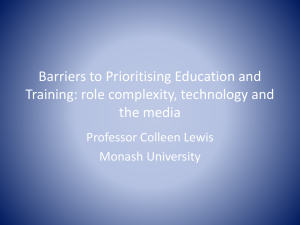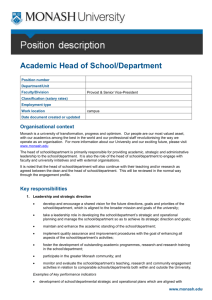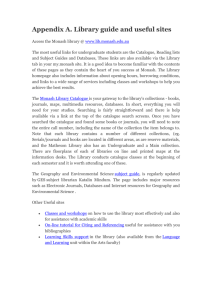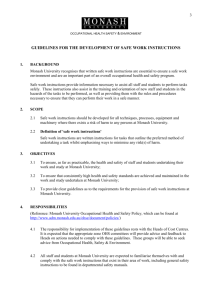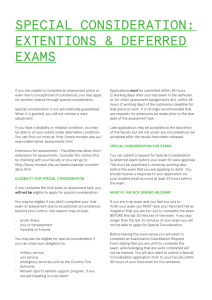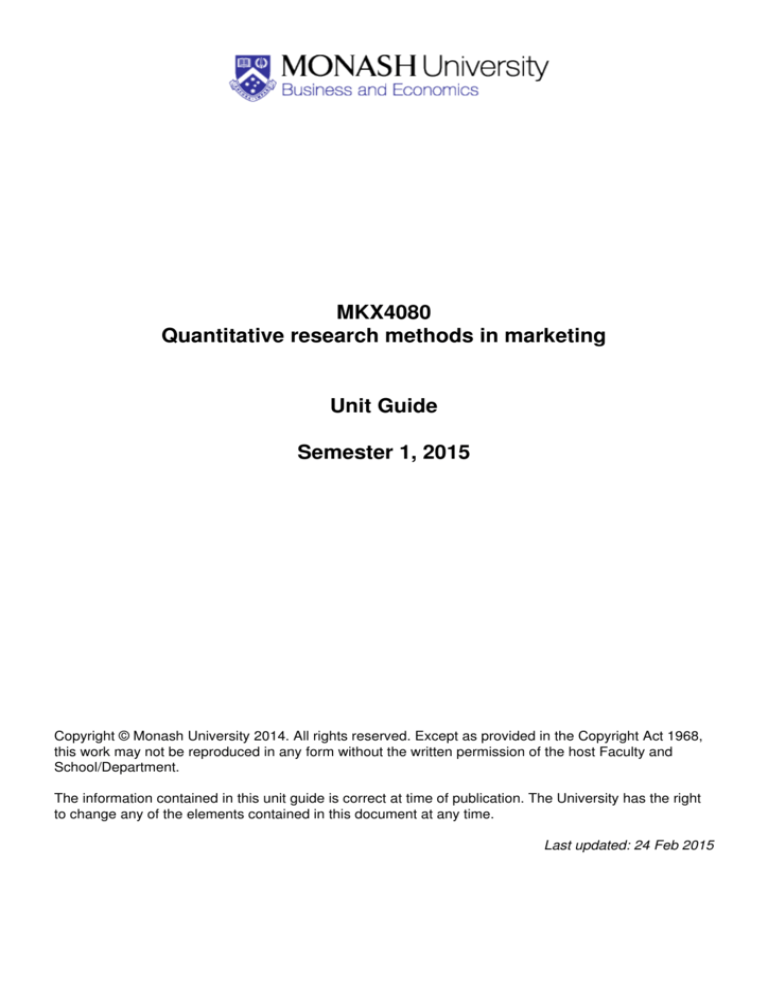
MKX4080
Quantitative research methods in marketing
Unit Guide
Semester 1, 2015
Copyright © Monash University 2014. All rights reserved. Except as provided in the Copyright Act 1968,
this work may not be reproduced in any form without the written permission of the host Faculty and
School/Department.
The information contained in this unit guide is correct at time of publication. The University has the right
to change any of the elements contained in this document at any time.
Last updated: 24 Feb 2015
Table of Contents
MKX4080 Quantitative research methods in marketing - Semester 1, 2015........................................1
Mode of Delivery..............................................................................................................................1
Workload requirements....................................................................................................................1
Additional workload requirements........................................................................................1
Chief Examiner(s)........................................................................................................................................1
Campus Lecturer(s).....................................................................................................................................1
Caulfield...........................................................................................................................................1
Your feedback to Us....................................................................................................................................2
Previous Student Evaluations of this Unit....................................................................................................2
Academic Overview...................................................................................................................................3
Learning Outcomes.........................................................................................................................3
Unit Schedule.............................................................................................................................................4
Teaching Approach..........................................................................................................................4
Assessment Summary.....................................................................................................................4
Hurdle Requirements...........................................................................................................5
Second marking...................................................................................................................5
Return of final marks............................................................................................................5
Assessment criteria..............................................................................................................5
Assessment Requirements......................................................................................................................6
Assessment Tasks...........................................................................................................................6
Assessment task 1...............................................................................................................6
Assessment task 2...............................................................................................................7
Assessment task 3...............................................................................................................7
Examination(s).............................................................................................................................................7
Examination 1..................................................................................................................................8
Learning resources......................................................................................................................................8
Feedback to you..........................................................................................................................................8
Assignment submission...............................................................................................................................8
Online submission...........................................................................................................................8
Required Resources....................................................................................................................................8
Prescribed text(s) and readings.......................................................................................................8
Recommended Resources..........................................................................................................................9
Recommended text(s) and readings................................................................................................9
Other Information....................................................................................................................................11
Policies..........................................................................................................................................11
Graduate Attributes Policy.................................................................................................11
Student Charter.........................................................................................................................................11
Student services........................................................................................................................................11
Monash University Library.........................................................................................................................11
Moodle 2....................................................................................................................................................11
Disability Liaison Unit................................................................................................................................12
MKX4080 Quantitative research methods in marketing Semester 1, 2015
An in-depth introduction to the critical thinking and planning required in the initial stages of a thesis or
research project. This unit will focus on the development of research proposal, research model, data
analysis and interpretation of results.
Mode of Delivery
Caulfield (On-campus block of classes)
Workload requirements
Minimum total expected workload to achieve the learning outcomes for this unit is 144 hours per
semester typically comprising a mixture of scheduled learning activities and independent study.
Independent study may include associated readings, assessment and preparation for scheduled
activities. The unit requires on average three/four hours of scheduled activities per week. Scheduled
activities may include a combination of teacher directed learning, peer directed learning and online
engagement.
See also Unit timetable information
Additional workload requirements
This unit is taught over 5 (block) days throughout first semester that is equivalent to 3 hours per week.
The total time commitment required for this unit is 156 hours. In addition to the 36 hours of class contact
students are expected to devote an additional 117 hours during the semester to studying for this unit.
This includes time spent in the preparing for and completing assessment tasks, together with time spent
in general study and revision.
Chief Examiner(s)
Associate Professor Yelena Tsarenko
Campus Lecturer(s)
Caulfield
Assoc Professor Yelena Tsarenko
Campus: Caulfield
Phone: +61 3 990 32354
Email: Yelena.Tsarenko@monash.edu
Contact hours: Via appointment
1
MKX4080 Quantitative research methods in marketing - Semester 1, 2015
Your feedback to Us
Monash is committed to excellence in education and regularly seeks feedback from students, employers
and staff. One of the key formal ways students have to provide feedback is through the Student
Evaluation of Teaching and Units (SETU) survey. The University’s student evaluation policy requires that
every unit is evaluated each year. Students are strongly encouraged to complete the surveys. The
feedback is anonymous and provides the Faculty with evidence of aspects that students are satisfied
and areas for improvement.
For more information on Monash’s educational strategy, see:
www.monash.edu.au/about/monash-directions/ and on student evaluations, see:
www.policy.monash.edu/policy-bank/academic/education/quality/student-evaluation-policy.html
Previous Student Evaluations of this Unit
The unit allows to gain a basic understanding of quantitative methods.
A practical subject that relates well to the thesis component.
Feedback has resulted in a revision of the unit towards a more applied approach requiring less prior
knowledge of statistics and research design
If you wish to view how previous students rated this unit, please go to
https://emuapps.monash.edu.au/unitevaluations/index.jsp
2
Academic Overview
Learning Outcomes
The learning goals associated with this unit are to:
1. develop an understanding of how to formulate a theoretical framework for a marketing
problem/opportunity
2. provide an understanding and appreciation of quantitative research techniques
3. provide an understanding of how to conduct data analysis
4. develop a comprehensive research report
5. develop a capability of communicating research findings.
3
Unit Schedule
Week
Activities
Assessment
0
No formal assessment or activities are
undertaken in week 0
1
2
Day 1 (Friday 6/3 9:00-17:00): Unit introduction;
Introduction to SPSS; Hypotheses testing, survey
design
3
Day 2 (Saturday 7/3 9:00-17:00): t-test, correlation,
factor analysis, qualtrics
4
Day 3 (Saturday 28/3 9:00-17:00): Presentations of
surveys; experimental design, mediation and
moderation
5
Day 4 (Saturday 18/4 9:00-17:00): Analysis of
variance, data analysis
6
Day 5 (Saturday 9/5 9:00-17:00): Data analysis and
Report Presentation
Assignment 2 (due Day 5)
SWOT VAC
No formal assessment is undertaken
SWOT VAC
Examination period
LINK to Assessment Policy:
http://policy.monash.edu.au/policy-bank/
academic/education/assessment/
assessment-in-coursework-policy.html
Assignment 1 (due Day 3)
7
8
9
10
11
12
Teaching Approach
This unit is a combination of lecture and practice. The lectures will provide the theory and brief practice
opportunities. You will practice the theory and SPSS skills in your study time in your readings and
assignments. Materials are delivered during the 6 block days and will provide the basis for your work .
Assessment Summary
Within semester assessment: 100%
Assessment Task
Value
Due Date
Questionnaire design in qualtrics (assignment 1)
25%
Day 3
Research Report
30%
Day 5
Home work and Class participation (assignment 3)
15%
Presentations and home work on
4
Unit Schedule
days 2-5
Examination 1
30%
To be advised
Hurdle Requirements
There is a hurdle requirement for this unit. Students must achieve at least fifty per cent in total to pass a
unit.
Second marking
Where an assessment task is given a fail grade by an examiner, that piece of work will be marked again
by a second examiner who will independently evaluate the work, and consult with the first marker. No
student will be awarded a fail grade for an assessment task or unit without a second examiner confirming
the result.
Note: Exceptions to this are individual pieces of assessment contributing 10% or less of the final mark,
unless the total of such pieces exceeds 30% of the final mark.
Return of final marks
Faculty policy states that 'the final mark that a student receives for a unit will be determined by the Board
of Examiners on the recommendation of the Chief Examiner taking into account all aspects of
assessment'.
The final mark for this unit will be released by the Board of Examiners on the date nominated in the
Faculty Calendar. Student results will be accessible through the my.monash portal.
Assessment criteria
Assessment Criteria Grading Descriptors available at:
http://www.buseco.monash.edu.au/esg/agu/policies/assessment.html.
5
Assessment Requirements
Assessment Tasks
•
Assessment task 1
Title:
Questionnaire design in qualtrics (assignment 1)
Due date:
Day 3
Details of task:
See Unit website
Release dates:
One day after Day 1
Weighting/Value:
25%
Presentation requirements:
A powerpoint presentation of up to 15 mins including discussion.
Estimated return date:
Assignments will be returned via EMAIL as soon as they are marked.
Criteria for marking:
The broad unit criteria apply as listed at the end of this document. These criteria can be
summarized into the following set of indicators.
♦ Completeness/Comprehensiveness
♦ Conciseness/ Succinctness
♦ Correct application of methods/interpretation of source material
♦ Creativity/Originality
♦ Clarity of organization and expression
Learning objectives assessed:
All
Submission details:
Submissions must be made electronically through MOODLE website.
Penalties for late lodgement:
A penalty of 10% of the mark allocated to this assessment task will be deducted for each
day that the assessment is late.
Assessment coversheet:
Work submitted for assessment must be accompanied by a completed copy of the
Faculty Cover Sheet which has been signed by the student. NO assignment will be
accepted or marked if it is not accompanied by a signed Assignment Cover Sheet
In the case of a group assignment, each member of the group must complete, sign and
attach to the assignment a separate copy of the Faculty Cover Sheet.
Assignments which are lodged electronically must be sent from your
Name@student.monash.edu.au Email address and must include an electronic copy
of the coversheet. Electronic lodgement from any other Email addresses will not be
accepted.
6
Assessment Requirements
•
Assessment task 2
Title:
Research Report
Due date:
Day 5
Details of task:
See Unit website
Weighting/Value:
30%
Presentation requirements:
Student present their results in class on Day 5 accompanied by ppt slides. No more than
30 slides!
Estimated return date:
Notification will be posted on MOODLE site within two weeks after submission
Criteria for marking:
See assignment 1
Learning objectives assessed:
All
Submission details:
Submissions must be made electronically through BLACKBOARD
Assessment coversheet:
Work submitted for assessment must be accompanied by a completed copy of the Faculty
Cover Sheet which has been signed by the student. NO assignment will be accepted or
marked if it is not accompanied by a signed Assignment Cover Sheet In the case of a
group assignment, each member of the group must complete, sign and attach to the
assignment a separate copy of the Faculty Cover Sheet. Assignments which are lodged
electronically must be sent from your Name@student.monash.edu.au Email address and
must include an electronic copy of the coversheet. Electronic lodgement from any other
Email addresses will not be accepted.
•
Assessment task 3
Title:
Home work and Class participation (assignment 3)
Due date:
Presentations and home work on days 2-5
Details of task:
See Unit website
Word limit:
One page (max) written report or a copy of the powerpoint slides needs to be submitted
prior the class - 9:00 a.m.
Weighting/Value:
15%
Estimated return date:
Learning objectives assessed:
All
Examination(s)
7
Assessment Requirements
• Examination 1
Weighting:
30%
Length:
Type (open/closed book):
Electronic devices allowed in the exam:
None
Remarks:
Take Home Exam:
Analyse one data set, write a reflective report based on these analyses and answer
specific research questions provided.
Five pages maximum (single spaced, exclusive of title page, references and
appendices). As above appendices should include the most relevant parts of the spss
output (no more than 10 pages in total) and a separate appendix should include the
syntax file.
Learning resources
Monash Library Unit Reading List (if applicable to the unit)
http://readinglists.lib.monash.edu/index.html
Feedback to you
Types of feedback you can expect to receive in this unit are:
• Informal feedback on progress in labs/tutes
• Graded assignments with comments
• Graded assignments without comments
Assignment submission
Online submission
If Electronic Submission has been approved for your unit, please submit your work via the MOODLE site
for this unit, which you can access via links in the my.monash portal.
Required Resources
There are no prescribed textbooks but purchasing your own copy of the Field and/or Hair and/or Pallant
books is recommended.
Prescribed text(s) and readings
There are no prescribed textbooks but purchasing your own copy of the Field and/or Hair and/or Pallant
books is recommended.
8
Assessment Requirements
Recommended Resources
Readings: see further below
Recommended text(s) and readings
TEXTBOOKS
Field, A. (2014). Discovering statistics using SPSS, 4th ed. Sage.http://www.uk.sagepub.com/field3e
[This book introduces basic statistical theory with an applied focus and has many hands-on examples. It
is very comprehensive and makes a good separation between content for beginners and for more
advanced levels of prior knowledge. As the title suggests, it uses spss throughout and provides practical
instructions as to how to use spss but also more widely, how to conduct research and analyse data. It
has a particular style and humour that may not appeal to everyone but the author tries hard to make
statistics and research look funny and interesting.]
Pallant, Julie (2013 or latest version), Spss Survival Manual : A Step by Step Guide to Data Analysis
Using Spss, Sydney: Allen & Unwin.
We will use some chapters from A. Hayes textbook "Statistical Methods for Communication Science" as
an additional reference and his
website http://www.afhayes.com/spss-sas-and-mplus-macros-and-code.html.
Malhotra, N.K (2010 or earlier) Marketing Research: An Applied Orientation (Sixth edition 2010 or earlier
edition), Upper Saddle River (New Jersey): Pearson/Prentice Hall. / Malhotra, N.K., Hall J., Shaw M.,
Oppenheim P. (2006) Marketing Research: An Applied Orientation (Australian version, 3rd edition),
Upper Saddle River (New Jersey): Pearson/Prentice Hall.
[This is a standard introductory marketing research textbook that students may have used in their prior
degree so can act as a reference point. Students can use either the generic or Australian edition. The
later chapters provide a good starting point and overview of multivariate methods and are useful
refreshers and cover most of the unit topics well although at a limited level. We will also cover some
topics and issues that are not covered in this, or similar, introductory textbooks. The textbook versions
titled ‘Essentials of marketing research’ provide a very basis overview and are no more than an outline
for the topics we cover but still can be a useful starting point. Other research textbooks such as Zikmund
and Babin , or Aaker et al can also be used].
Oppewal, Harmen (2011), "Experimental Research," chapter 10 in Research Methods for Leisure,
Recreation and Tourism, Eds. E. Sirakaya-Turk, M. Uysal, W. Hammitt, J. Vaske, CAB International,
Wallingford, Oxfordshire, UK, pp. 162-181 [available via library, manuscript will be available from MUSO]
[This chapter introduces key concepts in experimental research, aiming to provide an introduction to the
experimental way of thinking and a basic level of understanding of the rationale and basic building blocks
of experimental studies].
ADDITIONAL READINGS
A list of additional readings will be available via MUSO and/or will be provided via the unit library website.
These readings provide additional background to the methods discussed in this unit. Other readings
provide specific examples of how these methods have been applied in recent research studies. Several
of them will be used in lectures or in assignments. They concern articles that use various types of
research design (existing data, surveys, experiment) and that use the various analysis methods this unit
9
Assessment Requirements
focuses on: descriptive methods, multiple regression, scale development, factor analysis, analysis of
variance, logistic regression, cluster analysis, and structural equation models
10
Other Information
Policies
Monash has educational policies, procedures and guidelines, which are designed to ensure that staff and
students are aware of the University’s academic standards, and to provide advice on how they might
uphold them. You can find Monash’s Education Policies at:
www.policy.monash.edu.au/policy-bank/academic/education/index.html
Key educational policies include:
• Student Academic Integrity Policy and Student Academic Integrity: Managing Plagiarism and
Collusion Procedures ;
• Assessment in Coursework Programs;
• Special Consideration;
• Grading Scale;
• Discipline: Student Policy;
• Academic Calendar and Semesters;
• Orientation and Transition; and
• Academic and Administrative Complaints and Grievances Policy.
Graduate Attributes Policy
http://www.policy.monash.edu/policy-bank/academic/
education/management/monash-graduate-attributes-policy.html
Student Charter
www.opq.monash.edu.au/ep/student-charter/monash-university-student-charter.html
Student services
The University provides many different kinds of support services for you. Contact your tutor if you need
advice and see the range of services available at http://www.monash.edu.au/students
Monash University Library
The Monash University Library provides a range of services, resources and programs that enable you to
save time and be more effective in your learning and research. Go to www.lib.monash.edu.au or the
library tab in my.monash portal for more information.
Moodle 2
All unit and lecture materials, plus other information of importance to students, are available through the
virtual learning environment Moodle site. You can access Moodle via the my.monash portal.
Where to go for help
If you're stuck, confused or simply not sure how to approach Moodle, there are a number of Moodle
resources that you can tap into.
11
Other Information
Disability Liaison Unit
Students who have a disability or medical condition are welcome to contact the Disability Liaison Unit to
discuss academic support services. Disability Liaison Officers (DLOs) visit all Victorian campuses on a
regular basis.
• Website: http://www.monash.edu/equity-diversity/disability/index.html
• Telephone: 03 9905 5704 to book an appointment with a DLO;
• Email: dlu@monash.edu
• Drop In: Equity and Diversity Centre, Level 1, Building 55, Clayton Campus.
12


